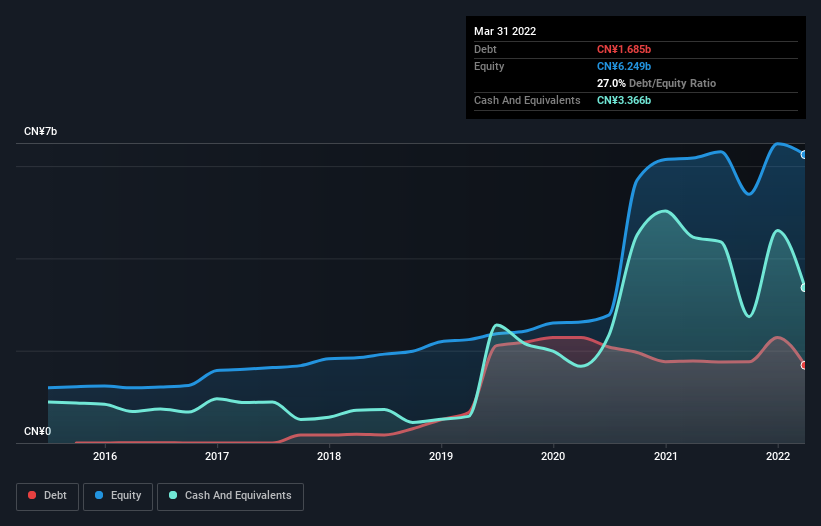- United States
- /
- General Merchandise and Department Stores
- /
- NasdaqGS:BZUN
Health Check: How Prudently Does Baozun (NASDAQ:BZUN) Use Debt?
Warren Buffett famously said, 'Volatility is far from synonymous with risk.' So it might be obvious that you need to consider debt, when you think about how risky any given stock is, because too much debt can sink a company. We note that Baozun Inc. (NASDAQ:BZUN) does have debt on its balance sheet. But the real question is whether this debt is making the company risky.
Why Does Debt Bring Risk?
Debt and other liabilities become risky for a business when it cannot easily fulfill those obligations, either with free cash flow or by raising capital at an attractive price. Ultimately, if the company can't fulfill its legal obligations to repay debt, shareholders could walk away with nothing. However, a more common (but still painful) scenario is that it has to raise new equity capital at a low price, thus permanently diluting shareholders. Of course, the upside of debt is that it often represents cheap capital, especially when it replaces dilution in a company with the ability to reinvest at high rates of return. When we think about a company's use of debt, we first look at cash and debt together.
View our latest analysis for Baozun
What Is Baozun's Net Debt?
You can click the graphic below for the historical numbers, but it shows that Baozun had CN¥1.69b of debt in March 2022, down from CN¥1.78b, one year before. But on the other hand it also has CN¥3.37b in cash, leading to a CN¥1.68b net cash position.

How Strong Is Baozun's Balance Sheet?
The latest balance sheet data shows that Baozun had liabilities of CN¥3.15b due within a year, and liabilities of CN¥1.01b falling due after that. On the other hand, it had cash of CN¥3.37b and CN¥2.03b worth of receivables due within a year. So it actually has CN¥1.24b more liquid assets than total liabilities.
This excess liquidity suggests that Baozun is taking a careful approach to debt. Due to its strong net asset position, it is not likely to face issues with its lenders. Simply put, the fact that Baozun has more cash than debt is arguably a good indication that it can manage its debt safely. There's no doubt that we learn most about debt from the balance sheet. But it is future earnings, more than anything, that will determine Baozun's ability to maintain a healthy balance sheet going forward. So if you want to see what the professionals think, you might find this free report on analyst profit forecasts to be interesting.
Over 12 months, Baozun saw its revenue hold pretty steady, and it did not report positive earnings before interest and tax. While that's not too bad, we'd prefer see growth.
So How Risky Is Baozun?
Statistically speaking companies that lose money are riskier than those that make money. And in the last year Baozun had an earnings before interest and tax (EBIT) loss, truth be told. And over the same period it saw negative free cash outflow of CN¥449m and booked a CN¥343m accounting loss. Given it only has net cash of CN¥1.68b, the company may need to raise more capital if it doesn't reach break-even soon. Overall, its balance sheet doesn't seem overly risky, at the moment, but we're always cautious until we see the positive free cash flow. There's no doubt that we learn most about debt from the balance sheet. But ultimately, every company can contain risks that exist outside of the balance sheet. For instance, we've identified 1 warning sign for Baozun that you should be aware of.
When all is said and done, sometimes its easier to focus on companies that don't even need debt. Readers can access a list of growth stocks with zero net debt 100% free, right now.
Valuation is complex, but we're here to simplify it.
Discover if Baozun might be undervalued or overvalued with our detailed analysis, featuring fair value estimates, potential risks, dividends, insider trades, and its financial condition.
Access Free AnalysisHave feedback on this article? Concerned about the content? Get in touch with us directly. Alternatively, email editorial-team (at) simplywallst.com.
This article by Simply Wall St is general in nature. We provide commentary based on historical data and analyst forecasts only using an unbiased methodology and our articles are not intended to be financial advice. It does not constitute a recommendation to buy or sell any stock, and does not take account of your objectives, or your financial situation. We aim to bring you long-term focused analysis driven by fundamental data. Note that our analysis may not factor in the latest price-sensitive company announcements or qualitative material. Simply Wall St has no position in any stocks mentioned.
About NasdaqGS:BZUN
Baozun
Through its subsidiaries, engages in the provision of end-to-end e-commerce solutions in the People's Republic of China.
Undervalued with excellent balance sheet.
Similar Companies
Market Insights
Community Narratives




